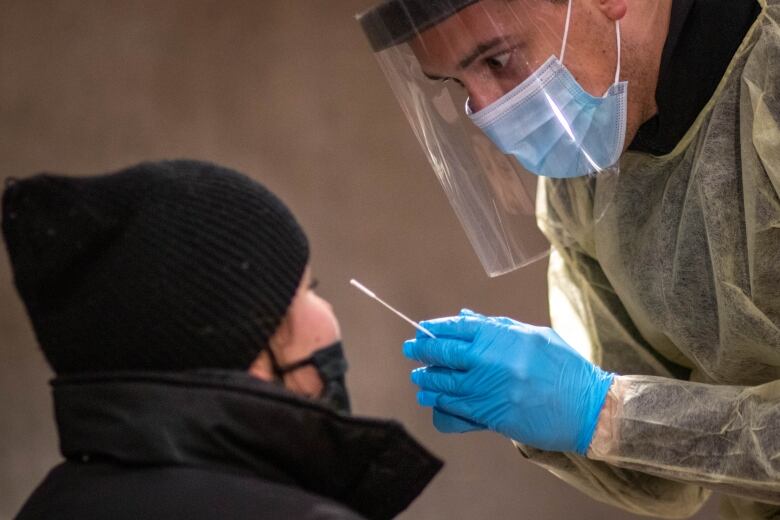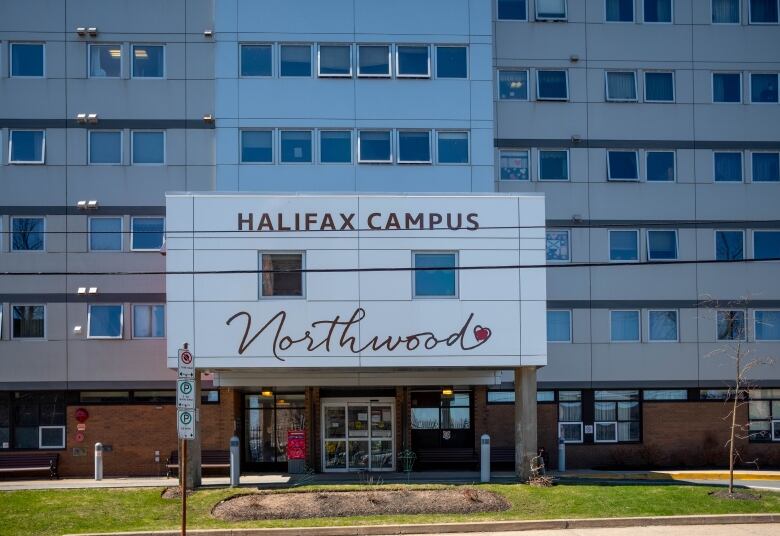9 new cases of COVID-19 in Nova Scotia, 1 at Bedford school
119 active cases in the province, state of emergency renewed

Nova Scotia reportednine new cases of COVID-19 on Friday, including one case at a Bedford school for children inpre-primary to Grade 4.
The student from BedfordSouth Schoolisself-isolating,the Health Department said in a news release. Everyone in a class that a confirmed case attended will be testedand is required to self-isolate for 14 days.
The school was closed Friday for cleaning and contact tracing, and isexpected to remain closed until at least Dec. 2.
All cases identified Fridayare in theCentral Zone. There are now119 active cases of COVID-19 in the province.

Nova Scotia labs completed 3,109 Nova Scotia tests on Thursday.
Rapid-testing pop-ups
An additional 1,142 tests were completed at the rapid-testing pop-up site Thursdayin downtown Halifax,finding four positive results. Those people were told to self-isolate and have been referred for a standard test.
The provincial state of emergency has also been renewed.The order will take effect Sunday and extend to noonon Sunday, Dec. 13, unless government terminates or extends it.
If you have no symptoms, but recently attended a party with more than 10 people in someone's home, went to a restaurant or bar that is open past 10 p.m., we are asking you to visit a rapid test popup site.
—@nshealthAnother rapid-testing site was held Friday for thosewithoutsymptoms at the Alderney Gate Public Library in Dartmouth from 1:30 p.m. to 8 p.m.
More than 2,700 rapid tests have been completed in the province since the first rapid-testing pop-up site last weekend.
Nova Scotia's chief medical officer of health, Dr. Robert Strang, reminded people Fridaythat rapid testing is an important part of the province's testing strategy, but it does not replace the need for a standard lab test.
Includingstandard lab tests and rapid tests, the province has conducted more than 13,000 tests in the last six days.
Premier Stephen McNeilsaid a vast majorityof those tests were young people in the 18-35 age group, the demographic representing the most COVID-19cases in Nova Scotia'ssecond wave.
"I want you to know how grateful I am," he said Friday. "By showing up and stepping up, you're protecting everyone around you and your community and that's the best example of leadership. I want to sincerely thank you."
1,058 ongoing investigations
When a person tests positive in the lab, Public Health employees investigate each close contact of that confirmed COVID case. There are 1,058 ongoing investigations in the province.
A week ago, that number was 276.
Strang said each positive case has an average of seven close contacts, but many cases have had considerablymore than that.
Because of the work involved to complete contact tracing, it takes time for close contacts of positive cases to be contacted by Public Health.

"I ask for people's support and patience during this. Public Health will get to you," Strang said. "While you're waiting, if you believe you're a close contact, just stay isolated at home. We need your help on this."
Strang said he's "relieved" to see relatively low case numbers in the last few days, but expects to continue to see high numbers of new daily cases in the next week to 10 days.
"We're just Day 2 into implementing our tight restrictions in the Halifax area. We're by no means out of the woods yet," he said.
There have been no positive COVID-19 cases linked toa recent party in downtown Halifax with close to 60 people in attendance, Strang said, but cases are coming from people socializing in groups.
Even when people followthe rules, the COVID-19 virus can be easily spread through social activities because many peopleare not symptomaticor have mild symptoms.
Earlier this week, the Department of Health and Wellness asked anyone who was at a bar or restaurantin the Halifax area past 10 p.m. to arrange for testing. Strang said nearly 8,000 people have come forward for a testsince then.
In the event a test is necessary, a person can fill out the self-assessment toolon the province's website.
Staff or patrons of bars or restaurants who were there after 10 p.m.do not need to self-isolate while awaiting a test.
But if a person was at one of the more than 100 recent exposure siteson any of thelisted dates and times, they need to self-isolatewhile awaiting a test. On Friday night, the Nova Scotia Health Authority issued eight new notices for the Halifax area.
Essential travel only
Although the province has not changed its self-isolation rules for travellers from other Atlantic provinces, Nova Scotians are still being urged to only travel for essential purposes, including accessing health care and attending workor school.
"I'm sorry to say, shopping is not an essential purpose," McNeil said.
Strang added to buy local, and buy online, if shopping needs to be done to help contain the second wave of COVID, which began Oct. 1.
"Wave 2 is clearly herein Halifax, and we're trying to keep it in Halifax," he said.
Truropolice said in a Facebook post Friday they've received numerous calls from the public asking police to take action against people they believe travelled from the Halifax area to their community in Colchester County.
"While we appreciate concerns about the spread of COVID-19, this travel restriction isn't in Public Health orders and cannot be directly enforced by police," the post said.
Researchers in Wolfville, meanwhile,have detected the virus that causesCOVID-19 in the town's wastewater.Strang said it could be a signal the virus has entered that communityalthough the research is experimental and the results may not be definitive.
Strang said the province is going to increase capacity at the primary assessment centre in Wolfvilleand is planning to have pop-up rapid-testing sites in place in that community early next week.
Rapid testing in long-term care
As of Friday,ongoing voluntary testing is being introduced in long-term care homes. Volunteers, designated caregivers,and employees who provide direct care to residentswill be tested every two weeks.
The testing will start at three locations: Northwood, Ocean View, and St. Vincent's. It will expand to six more facilities over the next two weeks.

"This is part of our effort to monitor, reduce, and prevent the spread of COVID-19 in long-term care facilities. None of us need a reminder of how important that is," Strang said.
With the federal government sayingCanadians could start getting vaccinated in early 2021,Strang said it's important to remember none of the vaccines is licensed by Health Canada yet and there is no certainty on the availability or the amount of doses.
"I need to be clear, we are expecting very small amounts to begin with ... We'll have to tightly control the supply and [have] very strict prioritization of who that vaccine needs to go to," he said.
New restrictions for restaurants, gyms
On Thursday,newrestrictionscame into effectin most of the Halifax area and parts of Hants County.
Restaurants are closed for in-person dining for two weeks, but can do takeout and delivery. Gyms, libraries, museums and casinos are also closed.
A list of what's open and closed in Halifax can be foundhere.
COVID casesin the Atlantic provinces
New Brunswick, Newfoundland and Labrador and Prince Edward Islandhave all brought back mandatory 14-day self-isolation for travellers. As of Thursday evening, Nova Scotia is still not requiringanyone travelling from the Atlantic provinces to quarantine.
The latest numbers from the Atlantic provinces are:
- New Brunswickreported 12 new cases Fridayand has a total of 114active cases. Effective midnight Thursday, anyone arriving in the province from all other provinces, including the Atlantic provinces, must self-isolate for 14 days.
- Newfoundland and Labradorreported four new cases on Friday. There are now 31active cases in N.L.EffectiveWednesday,anyone arriving in the provincefrom within the Maritimes will have to self-isolatefor 14 days.
- P.E.I.reported one new case Wednesday andhas twoactive cases. As of Tuesday,anyone travelling to P.E.I. from other Atlantic provinces will have to quarantinefor two weeks.Anyone who hasreturned from Nova Scotia or New Brunswick in the past week should limit their contact with others. As well,Islanders are being asked to not travel for the holidays.
Symptoms
Anyone with one of the following symptoms should visit the COVID-19self-assessment websiteor call 811:
- Fever.
- Cough or worsening of a previous cough.
Anyone with two or more of the following symptoms is also asked to visit the website or call 811:
- Sore throat.
- Headache.
- Shortness of breath.
- Runny nose.












_(720p).jpg)


 OFFICIAL HD MUSIC VIDEO.jpg)
.jpg)



























































































